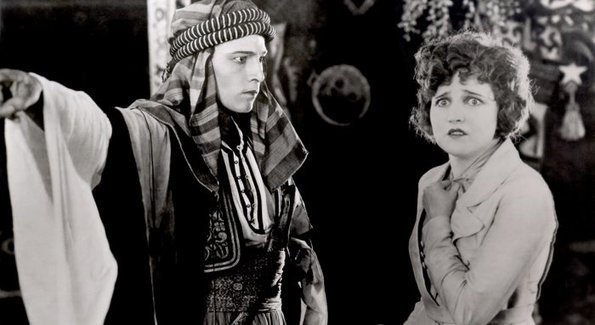It was inevitable, but I finally found the first truly unsavory film of the 1920s. How this film managed to garner such praise, especially to this day, is beyond comprehension for me. Certainly Rudolph Valentino was a star at the time, so it makes sense why it was such a box office hit – especially since The Four Horsemen of the Apocalypse, a far superior film – was actually the highest grossing film of 1921, the same year. However, despite how fantastic his performance actually was in The Four Horsemen, he actually manages to teeter on something quite terrible and blatantly false this time around. Put on top of that the overwhelming connotations of racism, sexism, and general distastefulness that mars what could have been a decent film at its core, this film just did not sit with me well.
To continue with the topic of the acting, despite Valentino’s valiant turn in The Four Horsemen where he showed range, depth, and equal doses of charm and empathy creating a magnificent protagonist, he somehow forgets all of that and goes for the campy, false, and an overwhelming amount of “I’ll make my eyes big so it seems like I’m evil” (I mean... just look at that picture below) that would’ve possibly worked in a horror film, but is completely out of touch with the story being told in this film. I’m hoping that Horsemen wasn’t a fluke and in fact he can do a pretty great job outside of this film. And perhaps that’s true considering so many people have actually praised his performance here – which I can’t possibly understand. On the other hand, despite a mostly wasted cast, there are two incredibly bright spots.
Agnes Ayres perfectly captures the soul of the film, and whether intentionally or unintentionally, capturing the essence of Stockholm syndrome as well. She already impressed in her limited time in The Affairs of Anatol from the same year, but here she gets a chance to truly excel and show her talents across a wider range. The true MVP for me was actually Adolphe Menjou (pictured below) as the only semi-reasonable character in the entire film. Despite not mentioning it in my review for The Three Musketeers, he was actually the stand-out there for me as well, playing a believably domineering and paranoid King Louis XIII. Here, he tones everything down completely yet still maintaining a stern sense of authority but also authenticity. Never for a moment do I question his title as a doctor or author of passion, but neither his friendship to Valentino’s Ahmed nor love for Ayres’ Diana as well. In fact, if not for Menjou’s entrance in the second half of the film, my entire rating of the film would be sufficiently lower. He brings a likability and relatability that was certainly missing for the entirety of the film and brings a sense of validity to the story.
Unfortunately, it isn’t simply Valentino’s off-the-wall performance that hinders the film; in fact, I could’ve lived with the poor lead performance and still granted the film an above-average rating had it not been for the, you know, entire film itself. Firstly, let’s briefly acknowledge the sexist and racist implications. Essentially, Ayres’ character, Diana, is a free bird and does not want to be caged by matrimony; yet as the story develops, she begins to get attached to Sheik Ahmed (Valentino) due to her literal captivity. Which leads into the racist insinuation (and perhaps this is something that has genuinely happened before, I’m not well-versed on the subject), in which the Sheik decides to capture a pretty white woman and make her his own – essentially kidnapping and raping her. So for the first third of the film, if I were to just be born and brought into this world, I would have learned that Arabs are rapists and women aren’t allowed to be think for themselves. Great.
But that’s not all. Now that she has been kidnapped and her senses numbed by her time in captivity and general feelings of helplessness, the film decides Ahmed is actually the hero of the story! Yes, that’s right. At first I thought, okay, her Stockholm syndrome has kicked in and she thinks she’s fallen in love with this guy when in truth he’s evil. But an outside force will help bring her mental state back and save her from this terrible curse. Enter Menjou’s character, a doctor from Paris who attempts to shirk the Sheik of his ways, but that only lasts about five minutes before it turns out he has a heart and they both love each other so.
Yeah.
I don’t get it either.
So it begs the question: Why is this film so loved? I never felt for one second that the Sheik was a hero, and the only potential saving grace turns out to give up on his quest to help the free bird suddenly in distress. The film offers a “happy” ending, but the entire time I kept wanting to yell at the screen ”HELP THIS WOMAN!”
Perhaps I’m wrong, though. Maybe the film is actually a twisted love story of the likes of 50 Shades of Grey or some other form of Stockholm syndrome/ captivity/ chains-and-whips-excite-me-type of love story. Maybe Valentino was actually playing this hero quite earnestly and I should have felt bad for him the entire time. I mean, the film did offer a lovely conclusion as to why he is how he is, which makes all of his actions completely justifiable. Maybe the real antagonist all along was the bandit at the end who attempted to steal Diana away, you know, the same exact way that Sheik Ahmed did in the beginning of the film. After all, he gave profoundly solid reasoning as to why he made such a life-changing decision in the first place: ”When an Arab sees a woman he wants, he takes her.”
Oh. Maybe not.




No comments:
Post a Comment